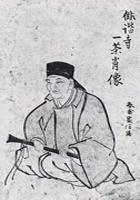Kobayashi Issa
Kobayashi Issa Poems
His death poem:
A bath when you're born,
a bath when you die,
...
Having slept, the cat gets up,
yawns, goes out
to make love.
...
All the time I pray to Buddha
I keep on
killing mosquitoes.
...
In these latter-day,
Degenerate times,
Cherry-blossoms everywhere!
...
Asked how old he was,
the boy in the new kimono
stretched out all five fingers.
...
In the thicket's shade
a woman by herself
singing the rice-planting song.
...
Ducks bobbing on the water--
are they also, tonight,
hoping to get lucky?
...
Face of the spring moon--
about twelve years old,
I'd say.
...
Kobayashi Issa Biography
Kobayashi Nobuyki (Issa) was born in Kashiwabara, Shinano province, to a farming family and began writing in his childhood, which was marred by misfortune and sadness, his mother died and his father remarried resulting in torment at the hands of his step mother and step brother. In 1777 he was despatched to Tokyo to study the Haiku form under such masters as Sogan and Chikua. He was forced to support himself by taking menial jobs before gaining entry into the Kasushika poetry school. At the age of 28 he was to be given a teaching post at the school but lasted just a year after it became clear that his modern style of haiku did not suit the clerical confines that were expected of him. For the next two years Kabayashi wandered the provinces of Japan where he found a patron in the form of Seibi Natsume, during this period he took the pen name (Issa). upon his return to Tokyo he was to publish his first collection Tabishui 1795 Issa was to visit most of the prominent Japanese cities of the day over the next few years, publishing the following collections to recount his travels. Chichi No Shuen Nikki 1801 Kyowakujo 1803 Shichiban-Nikki 1810 Waga Harushu 1811. In 1812 he returned to his native Kashiwabara and was to resume the feud with his Step family who had dishonoured his father's will. He also married at this time but again misfortune struck with his four children dying in infancy, and his wife later in 1823. During this period he gained his reputation as the leader of the Haiku form in the shinano province, with his style being open and natural his verse was read by many as being relevant to everyday life. Three collections were published during this period: Hachiban-Nikki 1818 Oragaharu 1819 tr: The year of my life. Kuban Nikki 1822. Kobayashi was to marry again and was blessed with a daughter born just after his death in 1827. He was seen as a re-juvinating influence on the Haiku form and has left a legacy of over 20,000 haikus, describing nature, life in everyday terms and sympathetic vunerability. his collections are translated and sold to this day.)
The Best Poem Of Kobayashi Issa
A Bath When You'Re Born
His death poem:
A bath when you're born,
a bath when you die,
how stupid.
Translated by Robert Hass
Kobayashi Issa Comments
my favorite among the great haiku triumvirate. so human. i became familiar with him through robert hass's the essential haiku and recommend it heartily. i don't usually buy books when i can borrow them, but i bought this one to refer to over and over. -glen kappy
Basho, Issa Kobayashi, Buson, Shiki..4 shining stars..!

After Kobayashi Issa’s death, haiku poetry began a steady descent into mediocrity... until Masaoka Shiki saved it